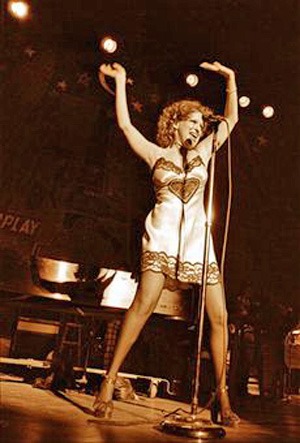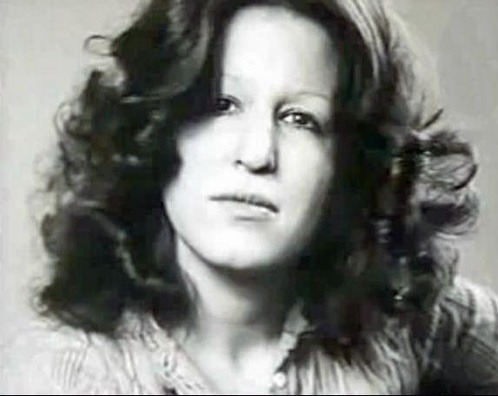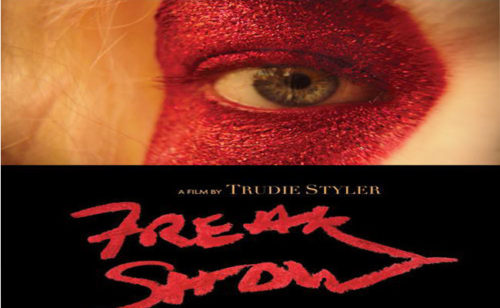AIDS: Vito Russo – A true pioneering film activist
by Richard Knight, Jr., for Windy City Times
2011-06-22
When discussing pivotal figures at the forefront of gay activism, gay history, and gay culture, there are few individuals that have had more of a lasting impact than that of the late writer and activist Vito Russo.
Certainly, there are few, if any individuals with such a profound impact on all three area. Russo, who died from AIDS complications in 1990, has for decades been renowned as the author of the seminal book The Celluloid Closet, a landmark work in which Russo detailed the history of gays at the movies. First published in 1981 and then republished with new material by Russo in 1987, the book has never been out of print since its publication.
Following Russo’s death, his close friend Lily Tomlin and other friends and colleagues made good on a promise to Vito to realize his dream of turning the book into a feature documentary. Filmmakers Rob Epstein and Jeffrey Friedman ( who also helmed The Times of Harvey Milk, Common Threads: Stories from the Quilt in which Russo appears–both Oscar winners–and the recent biopic of gay poet Allen Ginsberg, Howl ) completed the movie ( with narration by Tomlin ) which was released in 1995 to widespread critical acclaim and it remains the essential starting point for any film enthusiast wishing to discovery the history of gays and cinema.
But as author Michael Schiavi’s densely researched, moving and entertaining biography of Russo, the recently released The Celluloid Activist reveals, there was much more to this passionate gay man than a love for movies. A fiery activist, an outspoken proponent of gay rights, an eyewitness to the Stonewall riots, a close friend of Bette Midler and other gay icons, a groundbreaking gay journalist–Russo was all these things and more. Schiavi spoke with Windy City Times about the subject of his book ( which includes more than 200 interviews ) as part of our continuing AIDS at 30 series.
Windy City Times: When I became a film critic it was because I was inspired by the idea of writing from a queer perspective–and Vito’s book and the movie The Celluloid Closet were responsible for that. The first thing I thought when I heard about your bio was, “It’s about time. ”
Michael Schiavi: I absolutely agree and I’ve been hearing that from the beginning of interviews throughout this whole process. People have been saying, “Why isn’t there a biography of this gay rights giant?” and I totally agree.
Read more story below….
Windy City Times: I think what’s crucial for folks to know when examining our history about Russo is his impact in some many areas. The press release for the book really gets it right when it reads, “His life as a cultural Zelig intersects a crucial period of social change, and in some ways his story becomes the story of a developing gay revolution in America. ”
Michael Schiavi: He more or less defined gay white male urban persona of the ’70s and ’80s truly.
Windy City Times: Can you talk about the impact of one person that was so integral to all these organizations and cultural beginnings that we take for granted?
Michael Schiavi: Where does one even begin? That Vito was a co-founder of GLAAD [ the Gay and Lesbian Alliance Against Defamation ] , that Vito was a co-founder of ACT UP, that he was involved in GAA [ Gay Activists Alliance ] from near the beginning. That he took GAA, which was the first organization that was exclusively dedicated to fighting for gay rights ( they were actually the Gay Liberation Front first but it was not exclusively dedicated to gay causes ) . That GAA was the first organization to take on city, state and federal laws discriminating against LGBT folks–just gays and lesbians at the time. That Vito got into that organization and was one of the first people to say, “It’s wonderful that we’re out there doing all this politicking but the way to get people involved is through entertainment.”
Because Vito was obsessed with the movies from childhood on, he realized that audiences react to films in political ways if they’re taught how to do that. GAA had been having dances up to that point and Vito said, “What if we started having film screenings where people could see not only gay themed films–there were not that many at the time, this was 1971, ’72–but also mainstream films through a gay lens with an all-gay audiences–as well and cabaret nights where people could sing love songs onstage to people of their own sex and not feel afraid?” Well, people started feeling more comfortable in expressing themselves and feeling that they had a stake in what was there on the screen and the stage.
All of that led Vito into doing the lectures for “The Celluloid Closet” which began in about 1973 which he started with a small 20-minute presentation for films like Victim and The Children’s Hour and Boys in the Band–really just showing stereotypes–and this became quite popular and it was really the first time that gay people were looking at films politically and realizing that what was being put up on the screen about us had a lot about how we were being perceived in society. Within about three or four years, he had about an hour program and had begun touring it to various colleges and universities and then came the book of The Celluloid Closet which really invented the field of gay and lesbian media studies.
Windy City Times: And along the way, there he was up in a tree the night of the Stonewall riots.
Michael Schiavi: That, too ( laughs ) .
Windy City Times: It’s hard to imagine the culture that we live in now without the work of this one individual, which is stunning when you think about it. Well before his AIDS activism there are also his groundbreaking relationships–he was one of the first to put in writing the love that gay men have for certain performers. I’m thinking of his close friendships with Bette Midler and Lily Tomlin.
Michael Schiavi: Lily was much more established when he met her than Bette was. Lily was becoming an enormous star through Laugh-In and he met her through a friend and they just became fast friends. They had the same kind of sardonic sense of humor and he fell in love with her blinding talent. She was certainly not out at the time; in fact she really was not out at all during his life. He didn’t live to see her come out, which was a real tragedy–it would have meant so much to him to see that eventually she felt comfortable enough to be honest about it. But certainly, she was openly lesbian to him. Lily and Bette together allowed Vito to kind of help put The Advocate on the map in terms of celebrity profiles. The profile that he did of Bette in 1975 was the first time that The Advocate had a woman on its cover and that was eight years into its publication. It was also very, very rare for a major celebrity to do that kind of interview for the gay press.
Windy City Times: So he was blazing trails again.
Michael Schiavi: Yes. And when he was doing interviews with Bette and Valerie Harper and Lily Tomlin and Sally Kellerman, and others and put them in the gay press it was an astonishing achievement at that time. Bette he met at the Continental Baths. I think he met her soon after she started there in 1970. He was entranced by her talent; loved the pop culture riffing that she did and became good friends with her. He would have her and Barry Manilow, who was doing her accompanying, down to his apartment on 24th Street to watch this rare Bessie Smith footage. I learned this from Vito’s then-lover Steve Krautz. But his friendship with Bette was not as close as his friendship with Lily as the years went on. In later years, as I wrote about in the book, there were legal troubles because Vito was trying to screen the baths footage that he had taken without her permission and she got furious about that.
Windy City Times: And rightly so ( laughs ) . She had a point.
Michael Schiavi: She definitely had a point and their friendship suffered for many years although at the end of his life when she was in New York filming Scenes from a Mall with Paul Mazursky she found out that Vito was desperately ill and she called him and had him brought out to the studios where she was filming and they had a very sweet reunion. That was only three months before he died so it was lovely that they could end on that note.
Windy City Times: That is lovely. Switching tracks, let’s talk about Vito’s AIDS activism. In the book you talk about how he and Larry Kramer paired up because they were both apparently unhappy with the infighting that was going on at GAA and started ACT UP. But gay activism doesn’t seem to have quite the same impact now that it did then. If Vito had survived, where do you think he would be today politically?
Michael Schiavi: Anger was such an integral part of Vito’s persona so I’m sure that he’d still be pissed off ( laughs ) , but always there would be enormous warmth and humor, too. I think if he were alive today he would be furious that the pandemic has been allowed to explode as it did in Africa, for one, and Asia as well. I think he would be livid at younger gay men, particularly, who grew up having all the information and often just choose to ignore it. Like the crystal meth culture; the partiers, people who more or less consciously disregard safe sex because they think AIDS to be a manageable disease and they have access to medical care that literally didn’t exist when Vito was sick.
I think he would be furious at people who have always had information that he and his contemporaries did not have when they were all getting very sick and then dying. The kind of activism that ACT UP did in the late ’80s was born out of such absolute panic and urgency and that doesn’t really happen in the gay community these days– thank God–so I don’t quite know what he would see or how he would try and shape activism today because the culture itself is so different.
Windy City Times: Would he have been onboard for the gay marriage fight?
Michael Schiavi: I think he would have been rather torn. On the one hand he would have been livid and out there screaming with everybody else because there are actually people who think that gays shouldn’t have the right to get married because our relationships are not valid and that would have enraged him to hear the hypocritical bullshit that you constantly hear from the right about, “We’re not prejudiced about gay people; we’re not trying to discriminate against gays; we’re just trying to protect marriage” and Vito would have been at the forefront decrying the hypocrisy of that. On the illogic of a statement like that he would have been extremely articulate and wonderful. On the other hand, Vito was never someone who believed in committed relationships particularly. He had no use for monogamy throughout all his relationships. Certainly he was in love with several of his partners but they were young men at a very different time when the notion of marriage really didn’t exist. It was absolutely utopic to think that gay men would ever have marriage rights and he really wasn’t interested in that for himself personally, ever.
Windy City Times: Let’s get back to Vito’s creative driving force–his passion for movies. You write about his obsession with presenting these movie nights and you write about the importance of gathering gay people together for this shared experience. This is something else that has fragmented since his death. In discerning the importance of that, he was also on the forefront.
Michael Schiavi: For me personally there’s nothing like that emotional moment of sitting in a film with an audience around you that “gets it” and certainly, I know that had more resonance in Vito’s time when gays and lesbians had never seen a movie except in a potentially mainstream situation. So you’re watching something like The Children’s Hour or The Detective or some early ’60s horror show where gays and lesbians are treated in such an awful way and you’re surrounded by straight people who are either laughing at the screen or pitying those poor creatures up there and you feel completely isolated because you know that you’re being talked down to by the movie itself.
To be able to sit in an audience that is all gay, if the film is in some way denigrating you, you know you’re surrounded by allies and there’s nothing like the safety of that and the feeling of community that it gives. If it’s something more recent that celebrates your culture or even just treating fairly or realistically your community–the family feeling of “We’re all sharing this moment together” takes over. But that is not what the world is like. Even though there’s much more visibility for us, and even though younger people are accepting us more, that’s still relatively rare. And to have that experience on a screen in a large audience setting is a kind of safety and celebration that we desperately need. Vito knew the importance of that.
Windy City Times: Are there films today that Vito would have championed? Would he have felt validated by movies like The Kids Are All Right or I Love You Phillip Morris?
Michael Schiavi: Phillip Morris he would have hated because that plays to every stereotype that he would like to have seen gone out of date with La Cage. The Kids Are All Right, I think he would have enjoyed. The portrayal of a complicated but honestly portrayed lesbian relationship where you have two women who are trying to work through their problems I think he would have been very intrigued by. It’s all handled with great wit and he would have loved Annette Bening’s performance–that was kind of old style, flamboyant performance that sort of harkened back to the lesbian stereotypes of Caged that he loved. It’s a shame that he didn’t live to see films like that. He would have found them very encouraging.
Windy City Times: Was he a personal hero for you?
Michael Schiavi: Without a doubt. I came across The Celluloid Closet on a library shelf when I was 17 and closeted and very scared and here was a book that combined my two favorite things–gays and film–and that he was Italian like me. I can’t tell you how really hypnotic that was for me to find the book for the first time and realize that there was someone out there who was gay, who was writing about the movies and who was writing about them through the vein that movies are treating gays and lesbians badly. Hollywood had really shat on us and to know that there was someone out there screaming about this and the fact that he was doing this through such humor; such great, campy, bitchy, smart, tremendous humor was just riveting. I had never met anyone like that and when I was coming out as a teenager I wanted to meet gay men like Vito and it’s one of the tragedies of my life that I never got the chance to do that.
Windy City Times: The book and the film are still the primer for subsequent generations. On a side note, I want to mention that the cartoon that’s included in the book about Vito after his death was drawn by my late, good friend, another AIDS activist, Danny Sotomayor.
Michael Schiavi: Really?!
Windy City Times: Yes–and his executor Lori Cannon is also a close friend of mine. She didn’t know about the inclusion of the cartoon but was so touched to learn of it.
Michael Schiavi: Oh that’s wonderful! Thank you for spreading the word that way.
Windy City Times: Are you aware of this forthcoming documentary, ACTIVIST: The Times of Vito Russo?
Michael Schiavi: Yes, I’m in it actually. Jeffrey Schwarz, who did documentaries about Jack Wrangler and William Castle and is about to do one about Tab Hunter, is the director. He’s been working on it almost as long as I’ve been working on the book. The film is now in post-production and the film has a distributor and it’s very exciting. Lily Tomlin and Armistead Maupin and Larry Kramer and other big names are interviewed in the film–it’s a huge roster of people and he’s hoping that it will be out this fall.
See ore about The Celluloid Activist: www.uwpress.wisc.edu/books/4731.htm








